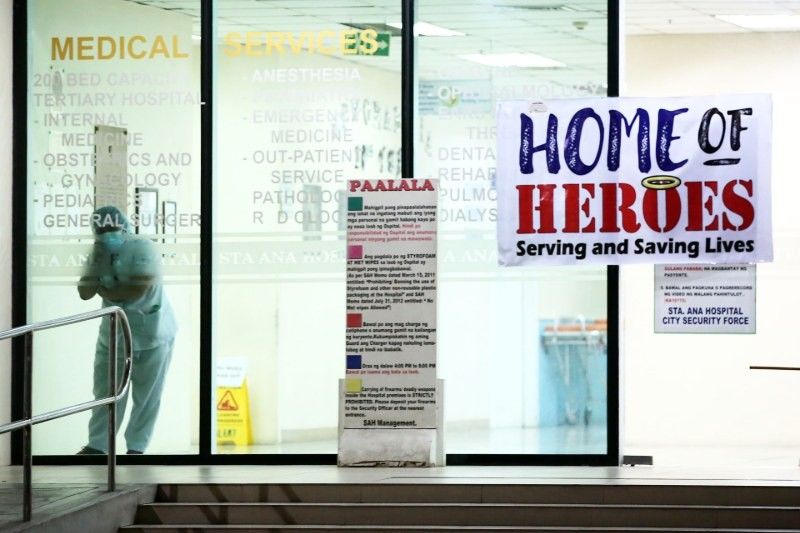'PUMs' should still be tracked, health group says of new COVID-19 classification scheme

MANILA, Philippines — A healthcare group on Monday said it is concerned that the Department of Health's (DOH) new guidelines on classifying potential novel coronavirus (COVID-19) cases could be used to hide supposed failures in surveillance and tracing of people who may have come in contact with infected patients.
In a statement issued early Monday morning, healthcare group Coalition for People's Right to Health (CPRH) urged the health department to be transparent in its tracking and classification of novel coronavirus cases, which continue to rise.
This came after the health department on Saturday announced a new classification system for potential and confirmed cases. DOH will no longer use "persons under monitoring" (PUMs), which was earlier defined as any asymptomatic person with travel history to affected areas or a history of exposure to a known COVID-19 case.
"Despite notions that, in a pandemic setting, 'exposure' is considered to be irrelevant, it cannot be denied that known exposure to positive cases should still be actively monitored and contact-traced," CPRH said.
READ: Asymptomatic cases excluded in DOH's new COVID-19 classifications
"As potentially pre-symptomatic individuals, the science of early detection and isolation of this group cannot be discounted. Shortcomings in contact tracing and surveillance must be addressed rather than [dismissed as these are] valid concerns."
'Suspect and probable dichotomy'
Officials of the Philippine General Hospital (PGH) have said that early detection could make all the difference in curbing the spread of the virus.
In the new DOH guidelines, the terms PUM and PUI—"person under investigation"—have been scrapped.
The health department now uses the following classification:
- "Suspect" cases referring to untested but symptomatic PUIs;
- "Probable" cases referring to symptomatic PUIs awaiting conclusive test results and;
- Confirmed cases of COVID-19
According to an explanatory note in the new guidelines, PUMs were not included because "residents are assumed to have been exposed to the infection."
Although CPRH said it welcomes the wider scope for suspect cases, the group wrote, "it must be made clear to the public the deeper reason for differentiating the probable. The initial DOH infographic fails to mention the treatment provision made for probable cases."
Citing guidelines from the Philippine Society for Microbiology and Infectious Diseases, the group added that "probable cases can begin treatment even without rtPCR confirmation, while suspect cases should be tested first."
'Blurring of lines excuses lack of mass testing'
CPRH also pointed out what they called "glaring oddities" in the administrative order, including the definition of "probable" cases.
According to the DOH AO, a suspect case is one whose testing for the new pathogen was "inconclusive" or "whose test was not conducted in a national or subnational reference laboratory or officially accredited laboratory."
CPRH said: "While immediate access to necessary treatment is needed, the blurring of lines between probable and confirmed cases seem to condone and excuse the lack of mass testing, and even the use of the controversial rapid test kits with questionable sensitivity."
In a series of circulars in mid-March, the Food and Drug Administration warned the public against buying unregistered and unregulated testing kits.
"We cannot vouch for its safety and efficacy by merely accepting the stated claims of a testing kit without the proper regulatory certification from the country of origin and a reliable NRA," FDA director general Eric Domingo said in the statement.
READ: FDA: No COVID-19 kits approved for commercial release yet
"These kits may give false positive and false negative results which may affect the response to this pandemic," he added.
On Sunday, the department also recorded 220 new cases of COVID-19, bringing the nationwide tally to 4,648 with 297 deaths.
CPRH pointed out that the Philippines now exceeds South Korea in terms of deaths, and had the second highest number of cases in Southeast Asia.
"At the end of the day, majority of cases remain in the community level, outside of the hospital-based guidelines that the DOH seems to favor. Strengthening the real frontlines of promotion and prevention will not only address COVID-19, but future epidemics and health crises," CPRH said.
If you believe you have come into possible contact with infected patients, you may be directed to the proper office of the Department of Health for advice through the following lines: (632) 8651-7800 local 1149/1150 or (632) 165-364.
You may also opt to call the Research Institute for Tropical Medicine at (02) 8807-2631/ 8807-2632/ 8807-2637.
- Latest
- Trending

































